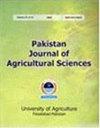Asymmetric effects of diesel prices and exchange rates on turkey's food prices
IF 0.6
4区 农林科学
Q3 AGRICULTURE, MULTIDISCIPLINARY
引用次数: 0
Abstract
This study analyses the asymmetric effects of the swings in diesel prices and exchange rates on Turkey’s food prices with the Non-Linear Autoregressive Distributed Lag (NARDL) model. For this purpose, Turkey’s diesel prices, exchange rate, and general food price index data for the same period between January 2000 and December 2019 were adopted. Considering that diesel prices are an essential cost item in agricultural production, it becomes crucial to determine the effect on food prices. Besides, the exchange rate fluctuations are expressed as another important macro variable that impacts food prices. As a result of the NARDL model, asymmetric co-integration between the general food price index, diesel prices, and the exchange rate was determined. Still, it has been observed that the negative and positive changes in diesel prices on food prices, in the long run, do not have a significant effect. On the other hand, the negative effect of the exchange rate was significant. It is concluded that a 1% decrease in the negative changes in the exchange rate will cause 0.94% decrease in food prices. Consequently, the general food price is affected by adverse shocks on the exchange rate in the long run. One may be concluded that the exchange rate should be considered while formulating policies about the swings in food prices. Especially, the local production of agricultural inputs affected by exchange rate fluctuations could be encouraged.柴油价格和汇率对土耳其食品价格的不对称影响
本研究采用非线性自回归分布滞后(NARDL)模型分析了柴油价格和汇率波动对土耳其食品价格的不对称影响。为此,采用了土耳其2000年1月至2019年12月同期的柴油价格、汇率和一般食品价格指数数据。考虑到柴油价格是农业生产中的一个重要成本项目,确定其对食品价格的影响变得至关重要。此外,汇率波动是影响粮食价格的另一个重要宏观变量。作为NARDL模型的结果,确定了一般食品价格指数、柴油价格和汇率之间的不对称协整。尽管如此,有人观察到,从长远来看,柴油价格对食品价格的正负变化不会产生显著影响。另一方面,汇率的负面影响是显著的。得出的结论是,汇率负变化下降1%将导致食品价格下降0.94%。因此,从长远来看,一般粮食价格受到汇率不利冲击的影响。可以得出的结论是,在制定有关粮食价格波动的政策时,应该考虑汇率。特别是,可以鼓励受汇率波动影响的当地农业投入生产。
本文章由计算机程序翻译,如有差异,请以英文原文为准。
求助全文
约1分钟内获得全文
求助全文
来源期刊

Pakistan Journal of Agricultural Sciences
AGRICULTURE, MULTIDISCIPLINARY-
CiteScore
1.80
自引率
25.00%
发文量
18
审稿时长
6-12 weeks
期刊介绍:
Pakistan Journal of Agricultural Sciences is published in English four times a year. The journal publishes original articles on all aspects of agriculture and allied fields.
 求助内容:
求助内容: 应助结果提醒方式:
应助结果提醒方式:


